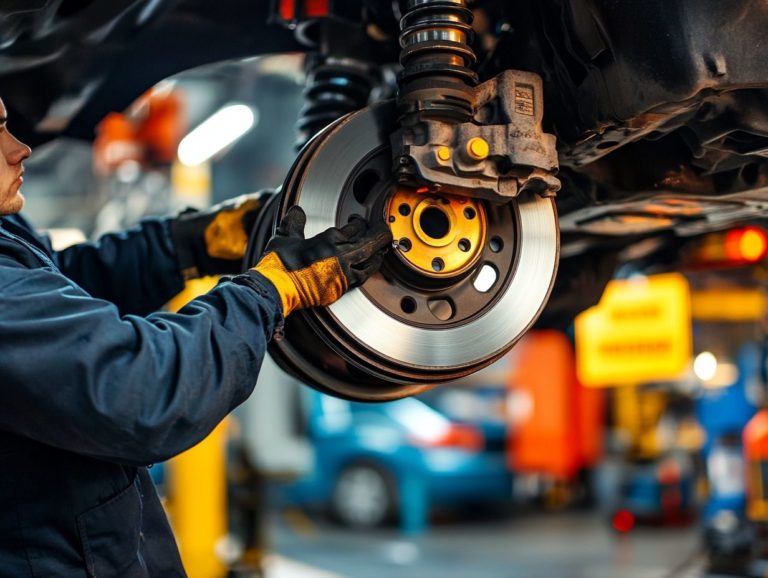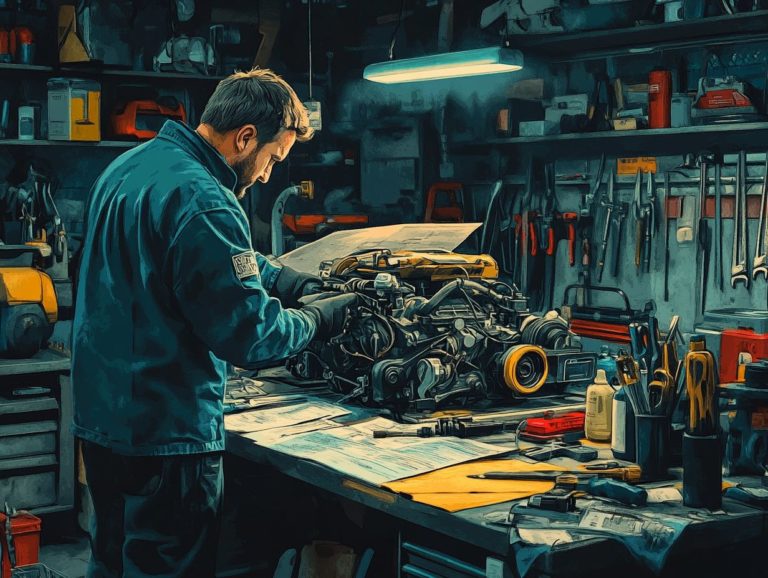How to Budget for Common Car Repairs
Maintaining a car is vital for your safety and its longevity. Deciphering the associated costs can often seem daunting.
This article simplifies the essentials of car maintenance, emphasizing the importance of budgeting for repairs.
From common expenses like brakes and tires to practical budgeting strategies, this guide equips you to create a repair fund. You’ll learn when to tackle a task yourself or when to summon a professional.
By the end, you’ll gain the confidence to keep your vehicle in prime condition without straining your finances.
Contents
- Key Takeaways:
- Understanding the Importance of Car Maintenance
- Common Car Repairs and Their Costs
- Tips for Budgeting for Car Repairs
- DIY vs Professional Repairs
- Frequently Asked Questions
- 1. How can I budget for common car repairs?
- 2. What are some common car repairs that I should budget for?
- 3. How much should I budget for car repairs?
- 4. Should I consider purchasing an extended warranty to cover car repairs?
- 5. What are some ways to save money on common car repairs?
- 6. How can I prepare for unexpected car repairs that may exceed my budget?
Key Takeaways:
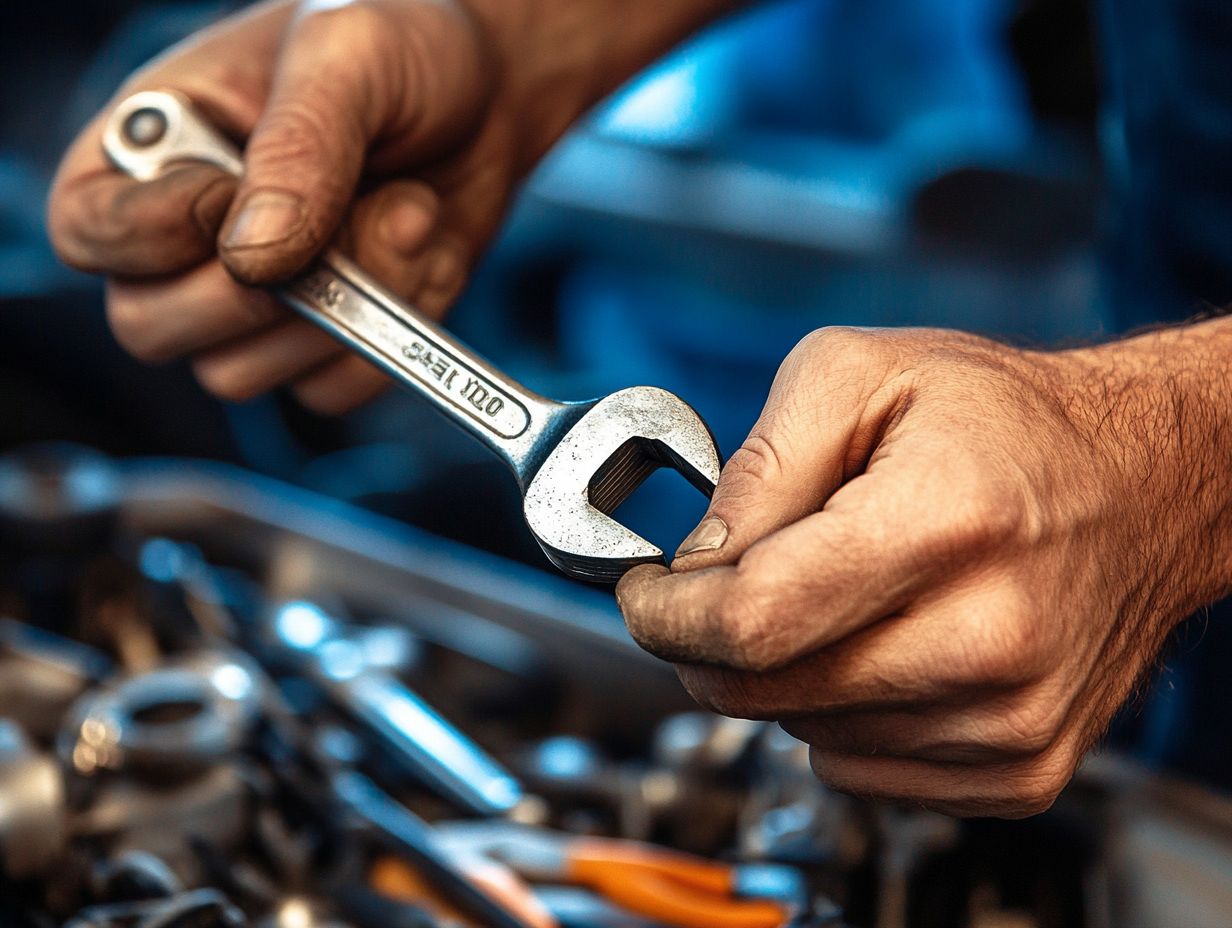
- Regular car maintenance keeps you safe and your car running smoothly!
- Common repairs such as brake and tire replacements, oil changes, and transmission repairs can be costly. Budget wisely to tackle them with confidence.
- Creating a car repair fund and shopping around for deals can help you manage repair costs effectively.
Understanding the Importance of Car Maintenance
Understanding car maintenance is crucial for every vehicle owner. It not only extends your car’s life but also keeps you safe on the road.
Engaging in regular maintenance think oil changes, tire rotations, and thorough inspections serves a vital purpose in averting unexpected repairs and daunting auto expenses.
Being proactive about your vehicle’s upkeep saves you money over time and grants you financial peace of mind. This foresight allows you to budget effectively for repairs and establish a reliable maintenance schedule, ensuring your car remains in top-notch condition.
Why Budgeting for Car Repairs is Essential
Budgeting for car repairs is vital for you as a car owner. It prepares you financially for unexpected automotive costs, helping you understand common car repair costs that can pop up out of nowhere.
Without a dedicated line in your budget for repairs, you risk encountering unforeseen financial stress, particularly with common issues like brake pad replacements or understanding the most common vehicle repairs such as catalytic converter troubles.
By setting aside funds specifically for this purpose, you can effectively manage expenses such as ignition coil or spark plug replacements, which are often necessary to keep your vehicle running smoothly.
Establishing an emergency or sinking fund is crucial. It acts as a safety net against sudden mechanical failures that could lead to costly repairs and disrupt your finances.
This proactive approach eases stress and ensures timely maintenance. In doing so, you extend the lifespan of your vehicle and enhance your safety on the road.
Common Car Repairs and Their Costs
Common car repairs can vary greatly in cost. It’s essential for you to be aware of the average expenses tied to various issues, whether it s tire rotations or brake pad replacements.
Knowing these costs aids in budgeting for repairs and equips you to secure accurate quotes when you visit a repair shop for maintenance. With this knowledge, you can navigate the world of auto care with confidence and clarity.
Brakes
Brake pad replacement ranks among the most frequent car repairs. Knowing the associated costs empowers you to better prepare for the expenses tied to vehicle maintenance.
A functioning braking system is vital for your safety. Acknowledge the various components at play like rotors, calipers, and hydraulic fluid all of which contribute to effective stopping power.
Stay alert for warning signs such as squeaking or grinding noises, a spongy brake pedal, or warning lights lighting up on your dashboard. These clues signal that it s time for a brake pad change.
Typical costs for brake pad replacement fluctuate based on your vehicle s make and model, often falling between $100 and $300 per axle.
To budget effectively for this essential maintenance, consider setting aside a small amount each month or exploring local discounts. Additionally, learning how to prepare for a car purchase budget can further ease the financial strain when it’s time to address this critical repair.
Do you have any budgeting tips or questions? Share them with us!
Tires
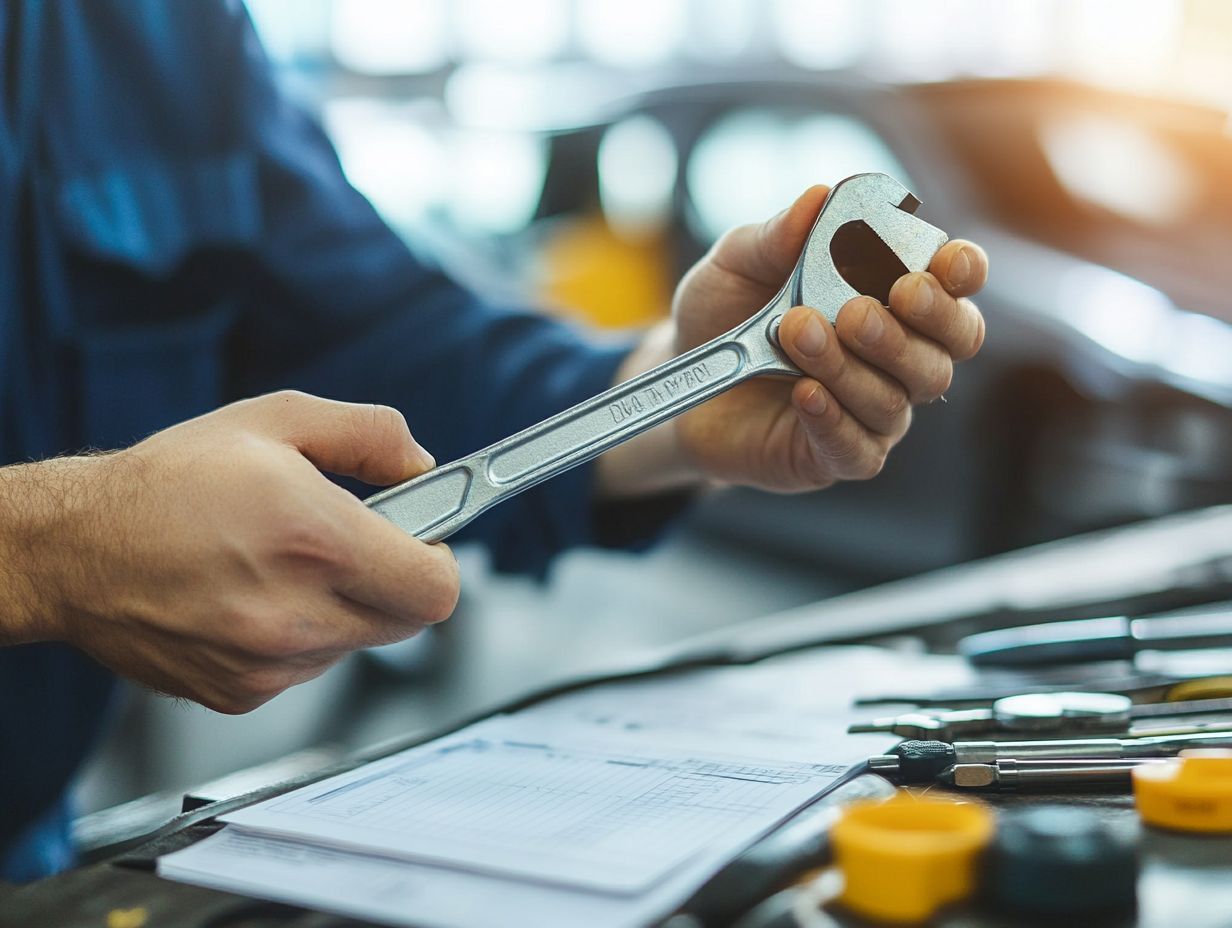
Tire rotation costs are often overlooked, but they are crucial for maintaining your vehicle’s performance and safety. This essential service ensures even tire wear, which extends the lifespan of your tires, boosts fuel efficiency, and enhances driving stability.
When tires wear unevenly, you might experience poor handling or reduced traction. These issues can significantly compromise your safety on the road. Schedule rotations every 5,000 to 7,500 miles, or follow the manufacturer s recommendations to effectively integrate tire care into your overall car care routine.
Keep an eye on your tires to help mitigate unexpected repair costs. Promptly addressing alignment issues protects your investment, which is critical for both daily commuting and long-distance travel.
Oil Changes
Oil change costs can fluctuate based on the type of oil you choose and the service provider you select. Recognizing the importance of this routine maintenance task is vital.
Regular oil changes are essential for preserving your engine’s health and ensuring longevity. They keep your engine lubricated, reduce friction, and help prevent overheating. Car experts generally suggest changing the oil every 3,000 to 7,500 miles, although newer vehicles may have extended intervals that cater to their specific requirements.
While conventional oil may be more budget-friendly, synthetic oil made from chemical compounds offers superior protection and typically comes with a higher price tag. For those mindful of expenses, explore the various options available at local service centers and establish a maintenance schedule.
Regularly checking your oil level and being alert to any unusual engine noises can significantly enhance your vehicle’s overall performance and lifespan.
Transmission
Transmission repair costs can be one of the most significant expenses you’ll face as a car owner. Tackle any issues promptly to prevent more severe damage down the line.
Understanding the common culprits behind transmission problems like fluid leaks, worn-out components, or overheating empowers you to take swift action. Regular inspections are absolutely vital; they help identify minor issues before they escalate into costly repairs.
Don’t wait; budget for transmission repairs now to avoid costly surprises later! This proactive approach allows for better financial planning and alleviates the stress of unexpected costs, ensuring your vehicle remains healthy and lasts for years to come.
Tips for Budgeting for Car Repairs
Effective budgeting for car repairs requires a thoughtful approach. Begin by planning your finances strategically and establishing an emergency savings fund to cushion unexpected expenses. Additionally, learning how to stay prepared for common car repairs can help you manage costs more effectively.
Adhering to a maintenance schedule not only keeps your vehicle in optimal condition but also helps you avoid unforeseen costs that can disrupt your financial stability.
Creating a Car Repair Fund
Creating a car repair fund is a savvy strategy for achieving financial tranquility. This enables you to handle unexpected repair expenses without the accompanying stress.
Establish this fund by setting aside a predetermined amount each month, customized to reflect the average costs of potential repairs specific to your vehicle model. Additionally, consider how to budget for your new car purchase to ensure you have a clearer picture of how much you should aim to save for common repairs.
Putting away a modest sum regularly will accumulate over time, resulting in a financial cushion that helps you sidestep strain when those inevitable repair bills arrive. To manage this fund effectively, consider keeping it in a separate account and automating transfers right after payday. This helps eliminate the temptation to dip into those savings.
The real advantage of this approach is the significant reduction in anxiety surrounding vehicle issues, allowing for better budgeting and proactive preparation.
Start planning your car repair budget now and enjoy peace of mind on the road!
Regular Maintenance and Inspections
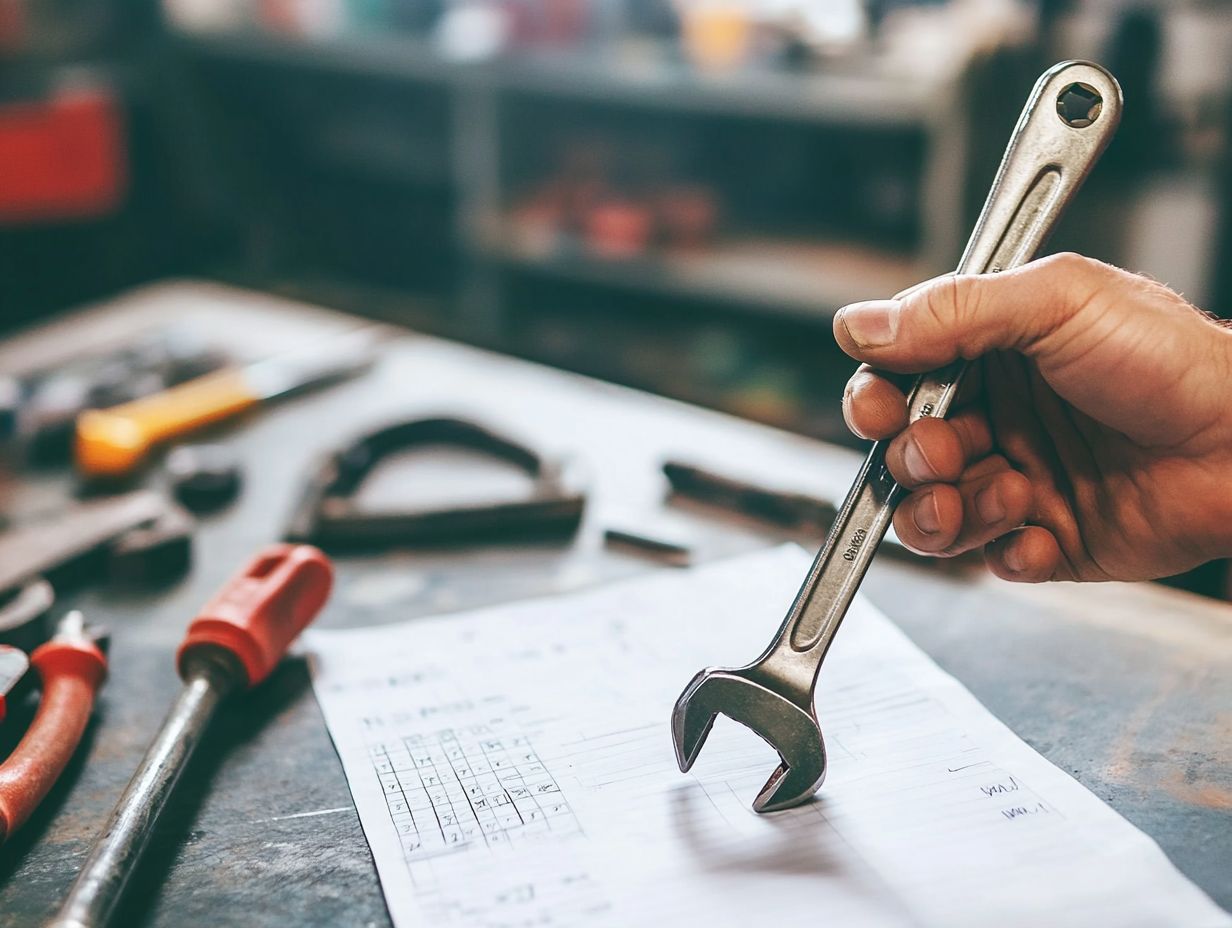
Regular maintenance and inspections are essential aspects of car ownership. They play a pivotal role in preventing costly repairs and ensuring your vehicle operates safely and efficiently.
By establishing a comprehensive maintenance schedule, you can significantly extend the life of your vehicle while enhancing its overall performance. Key tasks like oil changes, tire rotations, and brake inspections should be performed at regular intervals to maintain optimal functionality. Checking fluid levels can help you avoid unexpected breakdowns and replacing air filters and monitoring the battery are also important.
Stay ahead of costly repairs! Preventive maintenance not only keeps you safe but also saves you money by steering clear of expensive repair bills. A proactive approach enables you to identify potential issues early, ultimately saving you both time and money in the long run.
Shopping Around for the Best Deals
Shopping around for the best deals on car repairs and maintenance services can dramatically lower your automotive expenses while ensuring you receive top-notch service.
To make well-informed decisions, it s essential to gather detailed repair quotes from multiple shops. This reveals price differences and clarifies what each service involves.
Delving into online reviews and asking for recommendations from friends or family can provide a clearer perspective on the shop’s reliability and customer satisfaction.
Striking a balance between affordability and quality is crucial; sometimes, a lower price may come at the expense of repair excellence. Therefore, choose a repair shop that combines reasonable rates with outstanding craftsmanship for long-term benefits.
DIY vs Professional Repairs
Choosing between DIY (Do It Yourself) car repairs and enlisting the expertise of a professional can indeed be a delicate balancing act. Each option presents its own set of advantages and disadvantages, depending on the nature of the repair and your personal skill set.
When to Tackle Repairs Yourself
Tackling repairs yourself can save you money and bring a rewarding sense of accomplishment. However, it s vital to understand when and how to perform DIY car repairs safely.
For example, tasks like changing the oil or replacing spark plugs are often manageable for many car owners, requiring only basic tools and a bit of know-how. Always consult your vehicle s manual for specific guidelines and maintenance intervals. Familiarizing yourself with valuable resources such as online tutorials or automotive forums empowers you as you embark on these projects.
Always ensure you re using the correct parts and products, as this choice can significantly influence your car s performance and longevity.
When to Seek Professional Help
Knowing when to seek professional help for car repairs is essential for avoiding escalating costs and ensuring your safety on the road.
As a driver, you might easily overlook signs that indicate the need for specialized assistance strange noises, warning lights, or issues that seem to worsen over time. Recognizing these signals is crucial; it can prevent minor problems from evolving into major complications, which often lead to lengthy downtimes or unsafe driving conditions.
When you encounter complex repairs or situations that require specialized tools and expertise, consulting a qualified repair shop becomes critical. This ensures the use of the right techniques and equipment, guaranteeing that the job is done correctly and preserving your vehicle’s integrity while providing you with peace of mind.
Frequently Asked Questions
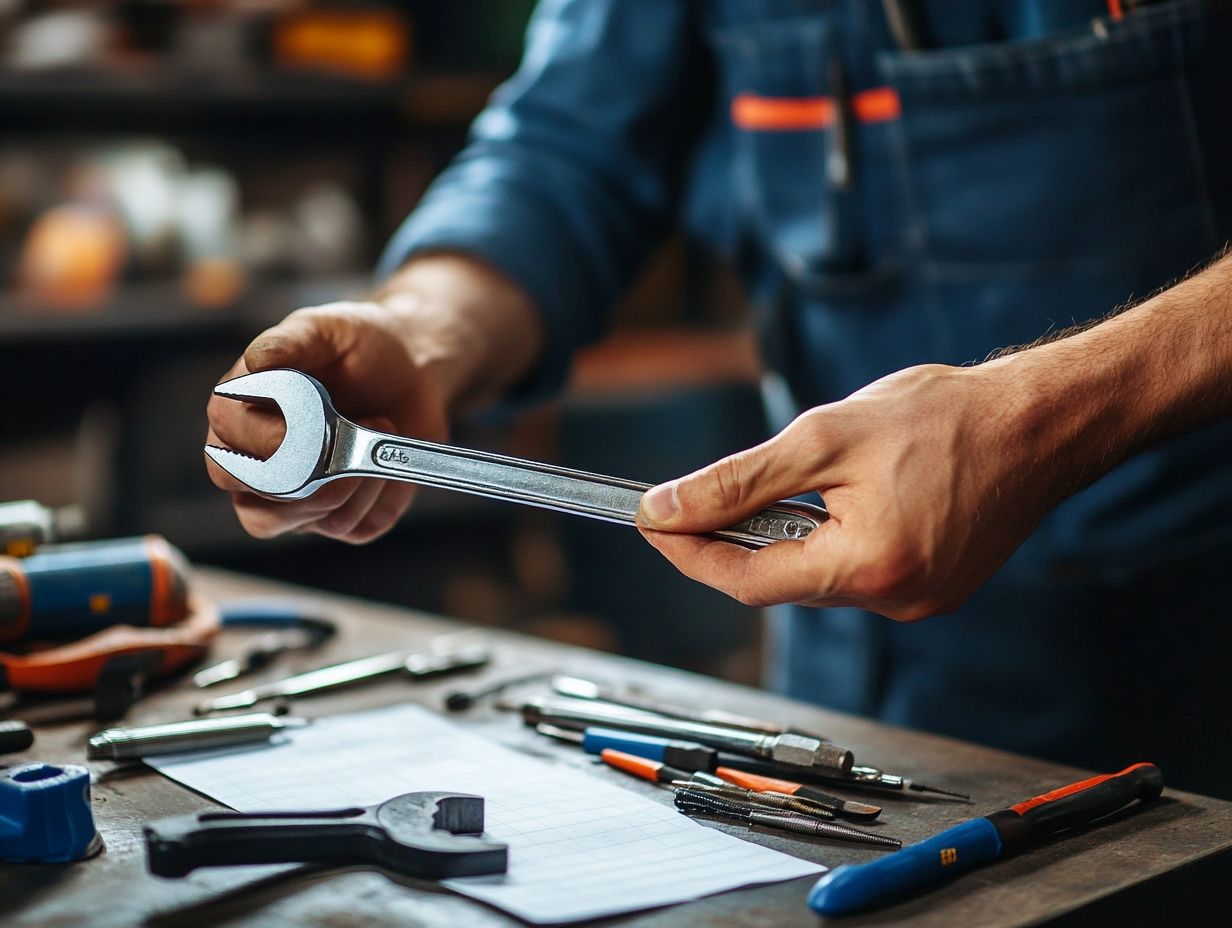
1. How can I budget for common car repairs?
The first step in budgeting for common car repairs is to research the average costs of these repairs. You can look up prices at local repair shops or check online resources. For more guidance on this topic, explore how to manage common car repairs on a budget. Once you have an idea of the costs, create a separate savings account specifically for car repairs and contribute to it regularly.
Start budgeting for your car repairs today to ensure a smooth ride tomorrow!
2. What are some common car repairs that I should budget for?
Common car repairs to budget for include regular maintenance like oil changes and tire rotations. You should also prepare for unexpected repairs by following tips for efficient car maintenance budgeting, such as brake replacements and transmission issues.
Don t forget to set aside money for parts that need regular replacement, like windshield wipers and batteries.
3. How much should I budget for car repairs?
The amount you should budget for car repairs varies based on your car’s make, model, age, and mileage. Experts suggest setting aside about $50-$100 per month for repairs, but this can change based on your car’s specific needs. To learn more about how to deal with car maintenance costs, consider your individual circumstances.
4. Should I consider purchasing an extended warranty to cover car repairs?
Extended warranties can offer added peace of mind, but they may not always be the best choice for budgeting car repairs. They can be expensive and might not cover all types of repairs, so be sure to evaluate the terms and costs before deciding.
5. What are some ways to save money on common car repairs?
Learning basic car maintenance and repair skills can help you tackle some fixes yourself, saving on labor costs. Additionally, shop around for the best prices on parts and consider buying used or refurbished items instead of new ones.
6. How can I prepare for unexpected car repairs that may exceed my budget?
Having an emergency fund for unexpected car repairs is crucial! This way, you can cover costs without stress.
You may also want to consider purchasing roadside assistance or car repair insurance to help with unexpected expenses.

